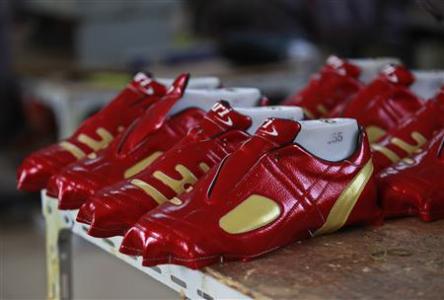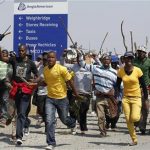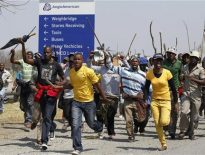(Reuters) – Top soccer-boot maker Adidas probably shouldn’t be worrying just yet but a rare venture that marries South Korean money with North Korean labour in the Chinese city of Dandong aims to make its mark on the world soccer scene.

At a temporary factory in a village on the edge of a bustling city that serves as a bridge between China and impoverished, isolated North Korea, 20 North Koreans hand sew soccer boots and dream of taking on the world.
The factory, overseen by managers sporting badges showing North Korea’s founder Kim Il-sung, have sold almost 10,000 pairs of boots at $100 a piece since it started full-scale operations in July, half of them to South Korea.
North Korea itself gets 100 pairs of boots a month from the factory as its share of payment, rather than being paid in cash.
“Boots can be made by machines but hand-sewn ones can be made to match individual preferences and they’re more comfortable,” said Chung Nam-chul, a veteran shoemaker.
“We play soccer in our boots to test them and pick good ones,” added Chung as he nailed down soles on a pair he was working on.
The visit by a Reuters news team was supervised by North Korean managers attached to the factory where workers sew under the slogan “Our Technology. Best Quality Soccer Boots”.
Chung and his fellow workers from the North Korean capital, Pyongyang, are members of the April 25 Sports Club, one of the most successful North Korean soccer league teams, which is run by the Korean People’s Army, the North’s armed forces.
As in the old days in communist eastern Europe, soccer teams in North Korea tend to be part of the state apparatus with businesses attached to them.
The workers at the Dandong factory are the tip of an iceberg of an estimated 60,000-70,000 North Koreans working overseas in a bid to earn much needed hard currency for the state, which has been heavily sanctioned for its nuclear programme.
A South Korean official at the factory told Reuters that workers got to keep all of the $200 a month they were paid.
Many of the North Korean workers in Russia, China and the Middle East are paid in vouchers rather than cash that go straight into the coffers of the North Korean state, according to refugee groups in South Korea.
The North and South remain technically at war after the 1950-53 Korean War ended in an armistice. Apart from an economic zone on the border between the two countries, cooperation between the rich South and the poor North is rare.
In comparison with the grinding poverty of most people in North Korea – where the United Nationssays a third of children are malnourished – the workers in Dandong appear well off.
PORK, SONGS, GIFTS
The two-storey green-coloured factory has dorms, a cafeteria, and a recreation room. Workers have their own chef who sometimes makes grilled pork belly for after-work parties where they sing songs about the reunification of the two Koreas.
Those in Dandong are also close to home, unlike their compatriots labouring in lumber camps in Siberia or construction sites in the Middle East.
“We can see our television channels. And we also sing our songs about our Marshal, our Marshal Kim Jong-un,” said seamstress Kwon Ok-kyung, referring to the North Korean leader who took power in 2011 after the death of his father.
Kwon works eight hours a day, five days a week at her sewing machine. Workers are allowed to meet their families in a North Korea city across a border river once a month and take bags of gifts home.
“In the beginning, when I didn’t know anything about sewing, it was hard but now it isn’t hard anymore … There’s no problem now,” she said.
One of the supervisors of the visit stopped Kwon talking when she was asked how it felt to be sent abroad to work.
Because of the risk of defections, North Korean workers sent abroad are generally loyal to the regime and its ruling Kim family. Their families back home act as guarantees that they will come back, according to defectors in the South.
Far from being slave labourers, many of the tens of thousands of North Koreans working abroad seek those jobs as a way of earning hard currency, defectors say.
The boot factory was originally built in Pyongyang on land provided by the North Korean government. But most economic ties were cut after the South accused the North of sinking one of its naval vessels in 2010.
The factory moved to Dandong with a $415,000 cash injection from the South Korean city of Incheon, whose soccer team wears its boots.
With the North’s economy in tatters and imports outstripping exports by $3.3 billion, according to 2010 data from the International Monetary Fund, North Korea has been forced into China’s arms, exporting much of its mineral wealth to its big, now-prosperous neighbour.
North Korea’s official ideology is based on economic self-reliance, but in reality it has been unable to feed its people for decades and its plants and equipment lie idle because of a lack of electricity.
The small boot factory will not make much of a difference to the North Korean economy, but that doesn’t stop its workers from dreaming big.
“It would be really good if Messi came here and wore our shoes,” said Oh Sung-dong, one of the North Korean managers.
Argentine soccer star Lionel Messi plays for Barcelona and is sponsored by German giant Adidas whose boots he wears.
“When thousands of workers produce our soccer boots in Pyongyang, they can dominate the world,” said Joo Chul-soo, an official from North Korea’s National Economic Cooperation Federation.
(Additional Reporting by Reuters Television; Editing by David Chance and Robert Birsel)





